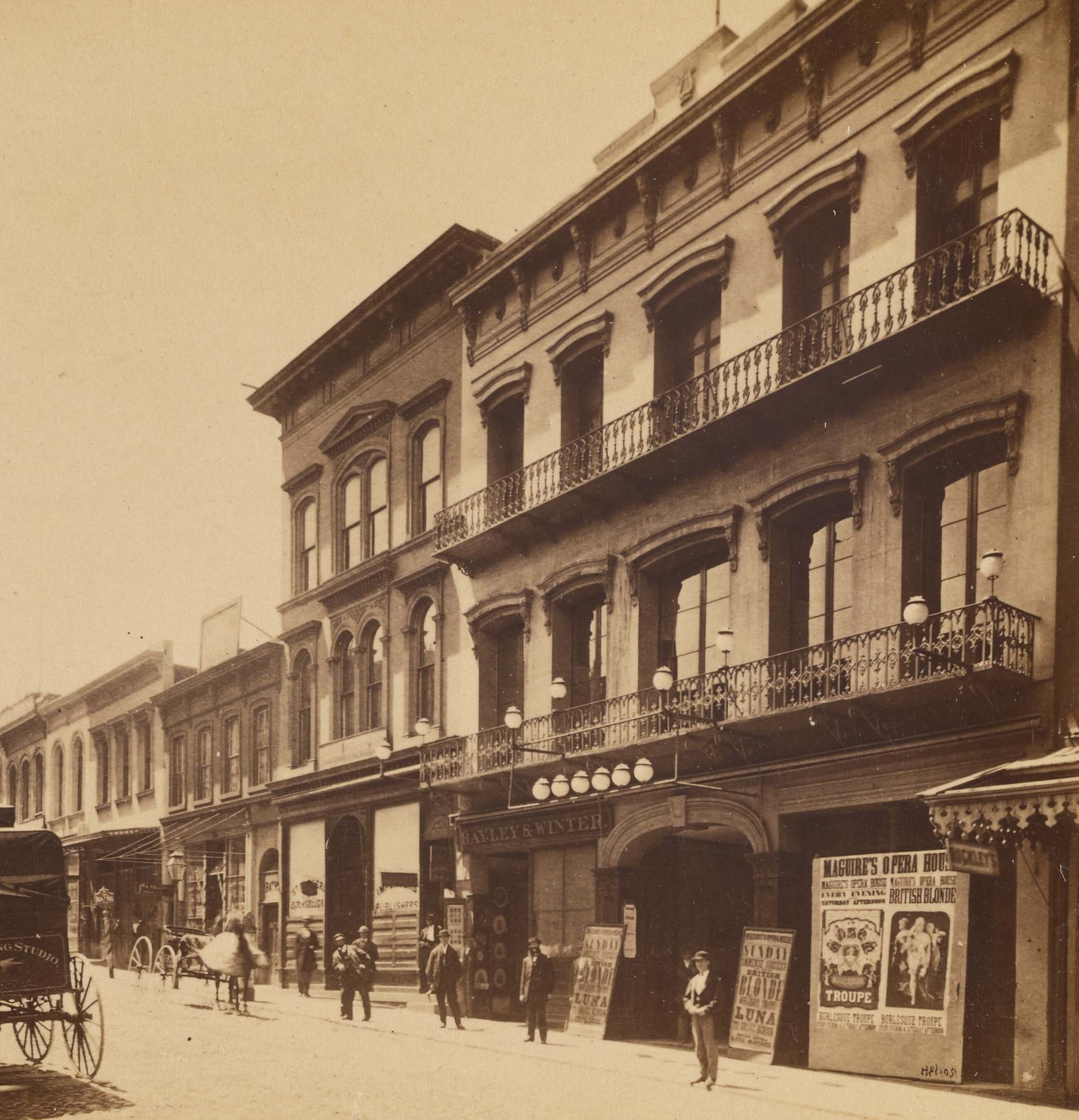
Maguire’s Opera House, by Eadweard J. Muybridge, 1870. The J. Paul Getty Museum.
While researching his essay “Twain Dreams: The Enigma of Samuel Clemens,” John Jeremiah Sullivan hunted through digitized newspaper databases for the earliest appearance of Clemens’ now-famous pen name. In so doing, he found a lost story Mark Twain had written in 1865 while reporting for the Territorial Enterprise, a newspaper in Virginia City, Nevada. The copy of the story Sullivan discovered had been syndicated by an Indiana newspaper, the Evansville Daily Journal, which published it on February 6, 1866, under the headline “An Impressive Impresario—A Pacific Manager not at all Pacific—The Latest San Francisco Sensation not Down in the Bills.” (The phrase “not Down in the Bills” referred to theatrical performances not listed in the playbill.) An unattributed note in the Daily Journal prefaces Twain’s article: “Quite recently Mr. Manager Maguire, of the San Francisco Opera House, appeared before a Police Justice of that city to show cause, if any, why he should, and to receive admonition that he should not, break all the bones, in that body of Vestvali the Magnificent.” Felicità von Vestvali, or “Vestvali the Magnificent,” was the stage name of Anna Marie Staegemann, a Polish opera singer trained in France and Italy, who became famous in America. Abraham Lincoln attended four of her performances. She had “quite recently” been in the news because of a contractual dispute with Thomas Maguire, opera impresario, whom she was suing for thirty thousand dollars. Maguire had called Vestvali a “hussy,” and “a damned fiend under the mask of a woman.” He had also threatened violence. “His last appearance is thus described by Mark Twain, under date of December 6th,” concludes the note in the Daily Journal. Twain’s account of Maguire’s “last appearance” on the public stage includes the word sasshia, likely an aberrant spelling of sashay, a loanword (from the French chassé) that—on December 6, 1865, when the Territorial Enterprise first published Twain’s story—was still a novelty in American English, having entered the language just thirty years before.
1865: San Francisco
There was a grand concert at Platt’s Hall—one of the finest that ever took place in that city, it is pretty generally conceded—given by Mr. McDougall, in aid of the British Benevolent Association. Mr. Maguire promised to loan him Miss Emily Thorne, the sweet singer, for the occasion, and Miss Thorne gave her own consent and right gladly. At the concert, however, Mr. McDougall distributed a printed slip around the house, containing the information that Mr. Maguire had withdrawn his permission for Miss Thorne to sing in the second part of the programme advertised, but stating that she would appear in the first part, however, and begging the audience to excuse this change in the bill—and then there was a parenthesis which mentioned no names but distinctly intimated that some people kept their promises better than others—nothing more, nothing less—but taking it in the connection in which it occurred, it plainly pointed at Tom Maguire as one of those “other” people—people who don’t keep their promises. Very well; an intelligent eye-witness tells us that he was in Kohler’s music establishment yesterday, and Mr. McDougall was there, also, talking with a lady at a little distance from him, when said Maguire proceeded violently into the said store, and without uttering a word did take the aforesaid McDougall by the throat and shake him with exceeding energy, and, moreover, said Maguire did rend, tear and dismember the coat of said McDougall, and yank the same from his person; and furthermore, the said Maguire did furiously assault the said McDougall, and smote him so that he fell and lay prone upon the earth—smote him upon the nose, that it did bleed; and likewise the said Maguire—this fiery, untamed man of sin—did then proceed to bang, and batter, and gouge, and bite, and claw, and jam, and tear, and chaw the said McDougall, until the intelligent witness aforesaid did discern with much sagacity that there was going to be trouble, and did then and there sally forth, sasshia, sail in and separate the said Maguire from the said McDougall, and did thus preserve the peace and dignity of the realm, and prevent the probable disturbance aforesaid. All which can be substantiated by oath or affirmation before any officer authorized to administer oaths and receive testimony.